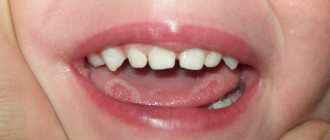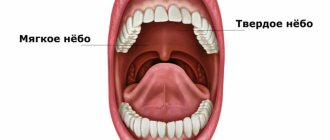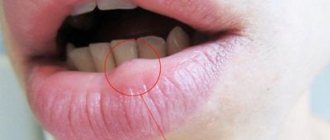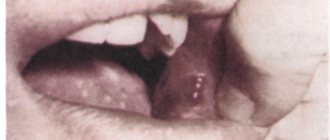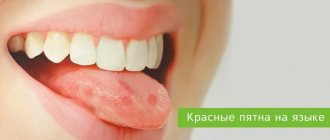A foreign taste in the mouth not only causes discomfort and prevents you from enjoying your favorite food, but also often indicates health problems.
The occurrence of a metallic taste in the mouth is familiar to a large number of people: this sensation is not the most pleasant, but not all of those who have encountered it try to find out its cause. There is nothing wrong with if the iron taste in the mouth appears once, but if it occurs periodically, then the reasons for this phenomenon should be found out.
Quite often you can hear complaints about a metallic taste in the mouth: why does it appear and how to get rid of it?
The reasons that cause an iron taste in the mouth can be very different: when faced with this symptom, you need to try to determine how often it occurs, and whether it is accompanied by any other signs.
First of all, it is worth clarifying what a metallic taste in the mouth is: it is unlikely to confuse this phenomenon with anything else, since it is a pronounced bitter taste with sour notes - a fairly accurate understanding of this taste can be obtained by touching the battery with your tongue . Often the appearance of such a taste is accompanied by an astringent sensation in the mouth and tingling of the tongue (partial numbness is also possible).
Metal taste as a symptom of oral diseases
Patients with gum problems often complain of a strong metallic taste that occurs repeatedly throughout the day. The most popular diseases that provoke such unpleasant sensations include periodontitis and gingivitis, which are accompanied by bleeding gums, and many people describe the taste of blood as metallic. It usually appears during brushing your teeth and after eating. Some patients feel as if there is a foreign body in the mouth, which causes serious inconvenience.
Loose teeth and tartar build-up can also cause a metallic taste. There is no point in trying to independently identify the causes - it is better to immediately contact a dentist.
Bad breath: what to do?
The fight against bad breath begins with careful adherence to good oral hygiene. If the source of the odor is bacterial activity, proper brushing of your teeth will help. Teeth should be brushed not only from the outside, but also from the inside, and also treat the chewing surface of the teeth. The brush angle should be 45°. Using dental floss, hard-to-reach areas between teeth are treated. If your teeth are in poor condition, simply brushing your teeth will not solve the problem. You will need to visit a dentist and remove tartar, and if your teeth have caries, cure them. It is recommended to visit the dentist at least once or twice a year.
It is also necessary to combat dryness of the oral mucosa. If you feel dry mouth, take a few sips of water and rinse your mouth. However, it should be remembered that frequent dry mouth can be a symptom of serious diseases. However, like the unpleasant smell itself. Therefore, if you have persistent bad breath, you should definitely see a doctor and undergo an examination.
Why there is an iron taste in the mouth: reasons not related to disease
If you notice an iron taste in your mouth, you should not immediately panic: there is a possibility that the unpleasant sensation is not associated with diseases.
It may appear due to:
- drinking mineral water with salts (often this product is enriched to compensate for iron deficiency in the body);
- drinking low quality drinking water (for example, supplied to the home through old rusty pipes);
- tongue piercing (the sensation appears as a result of the metal reacting with certain foods);
- using cast iron and aluminum cookware when preparing and eating food.
Diet
The diet will help improve digestion.
There are general rules that can significantly improve digestion and help with stomach pathologies, thereby getting rid of unpleasant symptoms. The first thing you should do is adjust your diet:
- Be sure to include healthy foods;
- Eliminate fast food;
- Refrain from taking processed foods;
- You should not eat spicy food;
- Carbonated drinks are prohibited.
The diet itself should consist of frequent meals, but in small portions. When creating a menu, you should pay attention to the following products:
- Be careful when consuming sugar and carbohydrates, if possible completely eliminate them from the diet. The same applies to confectionery products.
- As for fatty foods, they should be consumed in small quantities.
- Also reduce your consumption of fried and salty foods.
- It is better to limit yourself to drinking coffee and tea during the treatment period. But you should avoid products such as milk and cottage cheese.
- If possible, consume meat in limited quantities.
- Everyone knows about the benefits of fruits, but few people know that they cause fermentation and bloating, so you should exclude plums, grapes, and sour apples.
- But fermented milk products will be very useful. They have a beneficial effect on digestive processes and restore the balance of microflora. It is worth paying attention to those products that contain acidophilus and bifidobacteria.
- Vegetables and fruits contribute well to normal digestion, with the exception of those that cause fermentation. In addition, they saturate the body with vitamins.
- Do not forget about drinking water, which is very important and necessary for the body.
Medical causes of metallic taste
If a metallic taste appears in the mouth, this may indicate illness. Their list is very extensive. To make it easier to classify, diseases can be divided into two groups: dental and non-dental.
Diseases that lead to a metallic taste, which are systemic in nature and are not associated with teeth and gums, are as follows:
- diseases of the ENT organs (sinusitis, otitis, laryngitis, etc.);
- lung diseases (pneumonia, tuberculosis);
- diseases of the gastrointestinal tract (gastritis, cholecystitis);
- diseases affecting the nervous system (sclerosis, tissue tumors);
- anemia due to deficiency of iron or B vitamins.
It is not uncommon for a metallic taste to accompany diseases that develop in the oral cavity. These include:
- stomatitis (the mucous membrane of the oral cavity becomes inflamed, which is often accompanied by the formation of small ulcers);
- gingivitis (inflammation of the gums);
- periodontitis (the disease appears as a result of advanced gingivitis, when the infection no longer affects the external tissues, but the periodontium);
- glossitis (formation of plaque on the tongue, its inflammation).
Another common cause of taste associated with the oral cavity and dentistry is the installation of crowns and dentures. The appearance of a taste in this case is normal, provided that it goes away within 1-2 months. A sign that adaptation to the structure in the mouth has not occurred is unpleasant sensations in the form of tingling of the tongue, burning, and a feeling of dryness.
When is it necessary to consult a therapist?
Sometimes halitosis can be one of the symptoms of a systemic disease of the body: diabetes mellitus, accompanied by the appearance of the smell of acetone, gastritis and peptic ulcers, inflammation of the pancreas or hepatosis of the liver, chronic tonsillitis and sinusitis, inflammatory diseases of the lungs, which are characterized by a particularly unpleasant odor.
In patients with such diseases (especially undiagnosed or in the acute phase), manifestations of halitosis may persist even after complete sanitation of the oral cavity. They should seek advice from a therapist or continue treatment with a specialized specialist - an endocrinologist, gastroenterologist, otolaryngologist or pulmonologist.
Quick appointment Free consultation
How to identify the cause of a metallic taste in the mouth
Only a doctor can identify the correct medical causes and figure out why a metallic taste appears in the mouth after conducting appropriate studies and tests, so you should not hesitate to visit medical specialists.
Measures to identify the cause of unpleasant sensation in the mouth:
- biochemical and clinical blood tests to determine the level of various substances in the body (for example, if hemoglobin is low, this may indicate the development of anemia, a high creatinine level indicates kidney disease);
- a detailed dental examination, during which the general condition of the teeth and gums is determined;
- hormone level test;
- X-ray (used both in case of suspected diseases of the gastrointestinal tract and in the dental field);
- MRI, gastroscopy and various other methods depending on the type of disease detected.
How to eliminate halitosis
Important! You can completely get rid of this symptom only by treating the underlying cause and eliminating negative factors. You can only temporarily remove the symptom on your own.
How to get rid of metal smell:
- rinse your mouth with water and lemon juice or eat a small slice;
- chew ginger, cinnamon or cardamom;
- eat something sweet;
- include citrus fruits and tomatoes in your diet.
Note! Maintaining proper hygiene is also important. When brushing your teeth, you need to pay attention to the tongue, hard palate, gums and the inside of the cheeks. Pathological microorganisms accumulate on the entire surface of the oral cavity, which should be removed with a toothbrush.
Metal structures in the mouth
After installing braces and crowns, dentists warn patients about the possible appearance of a metallic taste - this is a normal phenomenon that should subside within a week after the procedure. If this period has passed, and discomfort still makes itself felt, the reasons may be as follows:
- allergy to metal. It is very rare, but taking an allergy test will not be superfluous. If the suspicion is confirmed, the only solution will be a complete replacement of all installed structures;
- galvanism (interaction between metals), which occurs in the case of installation of orthopedic structures made of different materials that interact with each other. If all the crowns and posts are made of the same material and the amalgam fillings are replaced, the problem will disappear.
If you have metal dentures or implants, an iron taste may become noticeable after consuming acidic foods and drinks. Accordingly, the presence of piercings on the tongue or lips can also cause a similar effect.
List of diseases that can be detected
Despite the fact that halitosis is not a disease, it is an important diagnostic symptom by which a specialist can assume the presence of a certain disease in the body. Suspected health problems may include:
- diseases of the nose and nasopharynx: sinusitis, pharyngitis, tonsillitis, adenoiditis;
- food allergies or respiratory rhinitis causing nasal congestion;
- dental diseases of teeth and gums;
- Gastrointestinal diseases: gastritis, increased stomach acidity, intestinal dysbiosis, etc.;
- endocrine disorders: diabetes, thyrotoxicosis, etc.
As can be seen from this impressive list of diseases, solving breathing problems can fall within the competence of a variety of highly specialized specialists: otolaryngologist, dentist, gastroenterologist, endocrinologist.
Metallic taste in the mouth of people of different sexes
A number of reasons that cause the sensation of metal are divided by gender.
For men who work in mining or in industries that use heavy metals, an iron taste may appear during each shift and disappear after the end of the shift. Long-term wearing of massive metal objects (bracelets, watches) also leads to a similar result, since during prolonged contact with the skin the concentration of ions entering the blood through the pores becomes too high.
Women may experience a metallic taste due to:
- pregnancy. Many expectant mothers note that a metallic taste periodically appears during pregnancy. Why does this happen? Firstly, the matter may be a lack of microelements and vitamins, and secondly, changes in hormonal levels and malfunctions in the functioning of receptors that recognize taste can be to blame;
- the use of weight loss drugs and various biological additives, which often leads to poisoning due to incorrect dosages and the desire to quickly get the most pronounced result possible;
- insufficient amount of fluid consumed (women resort to this remedy to lose weight and get rid of swelling). A metallic taste is one of the signs of dehydration.
It is best to start combating this not very pleasant feeling by visiting a doctor who will prescribe the necessary tests and examinations. Otherwise, you can look for reasons on your own and continue to experience discomfort regularly for a very long time.
Preventive recommendations
In conclusion of our review, I would like to draw the attention of parents to adjusting their children's diet. Our nutritional recommendations are as follows:
- Let us remember that “bad” bacteria love a sweet environment, so it makes sense to limit the consumption of industrially produced sweets and sugar.
- As a dessert, you can offer your child natural sweets made from dried fruits and nuts, as well as fresh fruit.
- Replace carbonated drinks with pure water or herbal tea made from chamomile and mint.
- To create beneficial microflora in the intestines, a child should consume more “live” fermented milk products: cottage cheese, kefir, yoghurts.
Parents need to understand that this delicate problem requires a qualified approach, since over time it can lead not only to problems at the physiological level, but also cause social isolation of the child.
Kaliningrad residents can make an appointment with a pediatric otolaryngologist by filling out an online form on our website or by calling: +7 (4012) 357-773 or +7 (4012) 973-100.
